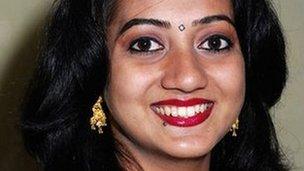Irish minister denies move to 'six-doctor' abortion law
- Published

Abortion is a divisive issue in Ireland with visible and vocal campaigning by both pro-choice and anti-abortion supporters
The Irish health minister has said pregnant women who feel suicidal will not have to face six doctors, after reports that planned abortion legislation would contain that measure.
James Reilly denied this was part of draft legislation to amend abortion laws.
Irish law prevents abortion unless there is a risk to the life, rather than the health, of the mother.
New laws were promised after the death of Savita Halappanavar last October.
The 31-year-old died in University Hospital Galway four days after suffering a miscarriage. The cause of her death was septic shock, E. coli in her bloodstream and a miscarriage at 17 weeks.
Her family claimed she might have survived if she had been given an abortion.
At the inquest into her death, a leading obstetrician said Mrs Halappanavar would probably still be alive today if she had had a termination in the first three days of her stay in the hospital, but that under Irish law an abortion would have been illegal because there was "not a real and substantial risk to her life" at that stage.
Her death focused international attention on the Republic of Ireland's abortion laws.
Since a Supreme Court ruling in 1992, known as the X case, abortion has been constitutionally available in the Republic where a woman's life, as distinct from her health, is at risk from the continued pregnancy.
The credible threat of suicide is constitutionally regarded as a reason for a termination.
But in the intervening years no government has introduced enacting legislation to give doctors legal certainty about when an abortion can be carried out.
Misapprehension
Irish television and newspapers reported over the weekend that a suicidal pregnant woman would have to be assessed by six specialists, including four psychiatrists, before an abortion could be allowed.
However, Mr Reilly said there would be no question of this happening.
"With respect, I think that some people may have formed the wrong impression. The heads of the bill [its general principles] are not finalised - they are still in process," Mr Reilly said.
"But I do want to allay any misapprehension people have.
"It is not the case, nor was it ever going to be the case, that a woman who is in a distressed state with suicidal ideation would be subjected to an interview by six different medical people either simultaneously or individually."
The health minister said he accepted that there were differences of opinion both inside and outside government and he said the draft legislation will come before the Irish cabinet on Tuesday.

Savita Halappanavar died after a miscarriage in an Irish hospital last year
Mr Reilly requested space and time to finalise the process before the bill is finally drafted.
"What we have to do here is honour our obligation to bring clarity to the law, so that the women of this country know what's available in relation to the services that are there for them and that the medical people who have to provide these services are clear on what's legal and what is not."
Elsewhere, the Tanaiste (Irish Deputy Prime Minister) Eamon Gilmore said the government intended to keep to its deadline of having abortion legislation "dealt with" before the summer recess.
- Published19 April 2013
- Published18 April 2013